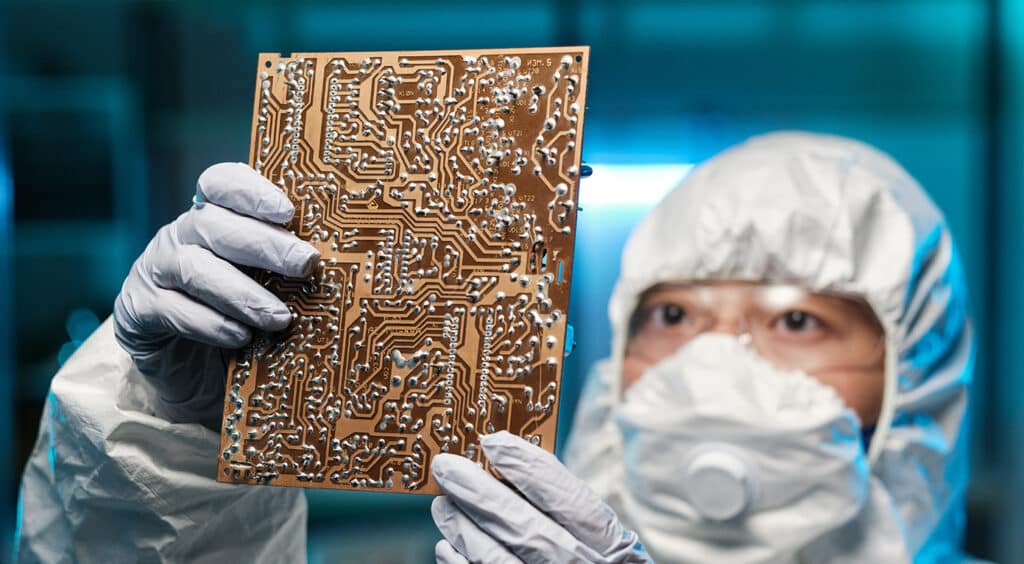
Are you interested in learning about semiconductor engineer jobs and how to qualify for them? Do you want to know what the career path in the semiconductor industry is like and how much the average semiconductor engineer’s salary would be? Find out what semiconductor engineers actually do, the educational qualifications they need to pursue, and the standard semiconductor industry pay they can expect. You’ll also learn what additional certifications and soft skills you may require to start your career and gain work experience at the world’s leading semiconductor companies.
What Does A Semiconductor Engineer Do?
Semiconductor engineers are qualified professionals who design, fabricate, troubleshoot, test, assemble, and package semiconductor devices to be used in electrical products. They are primarily in the electrical engineering field, although many job roles require extensive study of computer science, semiconductor physics, chemical engineering, materials science, and even nanotechnology. There are a wide variety of specialized job roles that fall under the broader category of semiconductor engineering, and it is important to pay close attention to the semiconductor engineer job description when looking for a job.
The Semiconductor Design Engineer

The design and testing of semiconductor components and devices are done by these semiconductor engineers. They design the circuit pathways through software called Electronic Design Automation (EDA) tools. Not only do semiconductor engineers be able to graphically plan their circuit layouts, but they are also able to run simulations and verify if the chips function as intended before they are physically fabricated. To learn more about this topic, read How Advanced Chip Design Is Done Today.
This may even require semiconductor engineers to work with electronic device manufacturers to truly understand their requirements and help in troubleshooting any issues they may encounter later down the road. Finally, thanks to advancements made in software engineering, designers need not work in laboratory settings or at manufacturing plants. There are software tools that work on the cloud, allowing these semiconductor engineers to work virtually anywhere.
The Semiconductor Engineer In Manufacturing

Many semiconductor engineers work in manufacturing environments called semiconductor cleanrooms. These are carefully controlled fabrication plants with special air-filtration, temperature, and humidity controls designed to maintain optimal manufacturing levels and prevent contaminants from affecting semiconductor products. Semiconductor engineers that work in these cleanrooms have to be familiar with all the safety protocols and be willing to work while wearing anti-contamination gear.
These semiconductor engineers have to calibrate and control the equipment used in various stages of manufacturing. First, there is the artificial growth of silicon ingots, which are cut into disk-shaped slices called ‘wafers’. These wafers then undergo many processes such as photolithography and etching to build up the circuit layouts on their surface. This etching process itself can be complex and may be done in a variety of ways including a dry etching process with plasma or wet processing techniques involving liquid chemicals. Individual circuits called ‘dies’ are cut from the wafer and then packaged to form the microchips.
Semiconductor engineers that work at each step of the manufacturing process have to ensure that all products are manufactured to specification and troubleshoot in case of any issues in their area of expertise. They utilize special machinery called ‘automated test equipment’ to test the completed integrated circuits for quality assurance before they are shipped off to the customer.
The Semiconductor Process Engineer

The process engineer will also work in the semiconductor manufacturing environment but they are more focused on examining the process itself to identify how it can be improved or optimized. If there are too many manufacturing faults detected by quality control, the process engineer has to figure out what the cause is and find ways to eliminate these issues in the future.
This type of semiconductor engineer is responsible for developing new production processes that have the potential to improve production yield and deliver products that perform better in their various applications. They need great technical writing skills to document any changes they introduce into the semiconductor processing environment, whether it involves a new recipe or device calibration. They also have to communicate all the necessary details to the other technicians and equipment handlers in the fabrication plant.
These semiconductor engineers also need to be familiar with all stages of semiconductor manufacturing and data analysis to understand how the current production line is performing. They require knowledge in applied physics and chemistry to understand how a new process will affect the electrical properties of semiconductor materials.
The Failure Analysis Semiconductor Engineer

A semiconductor engineer may also be required for the important role of failure analysis. This role is there to understand why a semiconductor device has failed after it has been shipped and delivered to a customer for usage. Usually, a failed electrical device will be checked by a technician from the device manufacturer’s end. If the issue goes beyond their skill or the manufacturer reports an entire batch of faulty semiconductor components, then it is up to the semiconductor engineer that specializes in failure analysis to take over.
They have a series of steps to open up the electronic devices and the semiconductor components for inspection. First, they are checked for electrical failure using parameter analyzers. This is then followed by many non-destructive microscopic techniques to verify the cause of failure before finally opening up the semiconductor component and examining its layers as a last resort. A failure analysis semiconductor engineer needs to be familiar with this diagnostic process to find the issues without destroying the evidence. For more on this, read Semiconductor Failure Analysis and Why It Is Important.
The Career Path For Semiconductor Engineers
Now that you understand the different roles available in semiconductor engineering from design to manufacturing, and beyond, let’s see what sort of educational background, certifications, and experience is needed to become a semiconductor engineer.
A Bachelor’s Degree In Electrical Engineering

Completing a bachelor’s degree in electrical engineering is the first step in getting into the industry as a semiconductor engineer since this is a requirement for many job roles. Here you can get introduced to the fundamentals of semiconductor materials and the devices that are manufactured from them. Alternatively, a related discipline material science, applied physics, information technology, information systems, chemical or computer engineering may also be a good starting point and can lead you to become a semiconductor engineer.
Start Working In The Semiconductor Industry

After completing your degree, it’s time to put your theoretical knowledge to work by getting an entry-level job at a semiconductor company. This could be a simple lab technician role where you can start learning industry-specific skills. In fact, some university students enter internship programs while continuing to study, which gives them a head start on acquiring skills that will be useful later when they apply for a full-time job. Students may even get to work in a cleanroom and learn all the required protocols to keep the lab area contaminant-free.
A Professional License
Depending on which country you choose to work in, there are licenses issued by professional engineering bodies to be recognized as a semiconductor engineer. To obtain this license, you may have to acquire a few years of work experience in a semiconductor-related field and pass the required exams. It is important to check the registration criteria and licensing requirements before you start working in your country of residence.
A Master’s Degree In Semiconductor Engineering
After a few years of work experience and you gain the license to become a semiconductor engineer, you can start thinking about a master’s degree in semiconductor manufacturing. These courses will go in-depth into the manufacturing processes, and provide specialized training. You can expect these courses to dive into the related mathematics, physics, and computing technology and science that is closely related to semiconductor engineering.
Professional Certifications
The education for a semiconductor engineer doesn’t really stop with getting a master’s degree. There may be additional exams you need to pass to maintain your professional license since continuing to demonstrate your working knowledge of the industry’s latest advancements is a must for any semiconductor engineer. Furthermore, it can help you stand out among a group of qualified applicants to be the ideal candidate that companies will want to hire.
The Required Skill Set For Semiconductor Engineers
Apart from their educational qualifications, semiconductor engineers need many other general skills as well as industry-specific ones that will enable them to complete their duties. These are preferred skills that recruiters are looking for and anyone planning to apply for a semiconductor engineer job needs to cultivate them.
General Skills
A semiconductor engineer needs exceptional problem-solving skills complemented by a good understanding of mathematics including trigonometry and algebra to perform troubleshooting. They may use microscopes for the identification of manufacturing defects, but an experienced engineer will develop a good eye for detail to spot the issue immediately.
A semiconductor engineer has to be able to utilize computers for designing, or running simulations. They also need data analysis skills to collect and interpret the information they gather from these simulations during the development process or real-world data. They also need to be able to spot trends in the data they gather.
A senior semiconductor engineer is also a project manager since they may be in charge of multiple engineering teams that carry out their process improvement projects across many production lines. They have to be able to manage their limited resources, both machinery, and staff on a given shift. They also need to be able to communicate effectively with all relevant production team members that are involved in a project.
Industry-specific Semiconductor Engineer Skills
In addition to problem-solving skills and a strong background in semiconductor theory, a potential candidate needs industry-specific skills to become a semiconductor engineer. Wet etching or wet processing is a very important part of manufacturing. While there are automated wet processing stations, semiconductor engineers working in a more research-oriented lab will need to know how to perform these functions without damaging the sensitive semiconductor components they are developing. Since this process utilizes chemicals like acids, they also need to know the appropriate safety protocols.
The same semiconductor engineer may not work at all stages of manufacturing, but they still need to be familiar with the entire process from design to the wafer stage to finished integrated circuits that get shipped to the customer. Furthermore, semiconductor engineers may be required to draft manufacturing technical specification documents that describe the electrical characteristics of semiconductor products. They will need exceptional technical writing skills to draft these documents while keeping to industry standards.
The Average Semiconductor Engineer Salary
The average salary of a semiconductor engineer varies depending on the country, as well as the seniority of the role, the required role-specific skill set, and the company that is employing you. In the United States, a semiconductor engineer may expect to earn an annual salary from the lowest of USD 65K to a high of about USD 125K with an average that sits around USD 90K.
In addition to the highly competitive pay, the position may come with an outstanding benefits package that includes health insurance, employee stock options, paid vacations, and retirement benefits. These additional benefits can increase the value of the compensation package, so it’s always best to read all the details when browsing through the latest job alert.
Job Outlook For Semiconductor Engineers
While there has been a global chip shortage in recent years, this is not necessarily a bad thing for people looking for jobs in the semiconductor environment since there is plenty of demand for highly-skilled workers. When looking at the job outlook studies conducted by the United States Bureau of Labor Statistics, over 20,000 electrical and electronics engineers will need to be recruited every year on average from 2021 to 2031 in the US alone.
Apart from companies like Intel, Texas Instruments, and Nvidia in the United States, there are more opportunities to be found elsewhere like Infineon in Germany, Samsung in South Korea, and of course TSMC in Taiwan which is the largest semiconductor manufacturer in the world. Businesses and consumers are always hungry for new technologies and the semiconductor industry will always need young talent to develop them. If you’re a university student that wishes to enter the world of semiconductor devices, there are plenty of opportunities for you to find.
To learn more about semiconductors, manufacturing techniques, and products, check out Inquivix Technologies!
FAQs
A semiconductor engineer is needed at every step of technology development from the design of semiconductor devices to the manufacturing and testing stage.
Yes. There is a lot of potential for growth in the semiconductor industry since they supply the crucial semiconductor components and microchips that new technologies like smart devices and artificial intelligence systems need to function.
First, you will need to get a strong educational background in electrical engineering or a related field like applied physics, chemical engineering, and materials science. While you’re studying for your bachelor’s degree, consider taking an internship at a semiconductor company to acquire the basic skillset needed to work in the field. After you complete your degree, start applying for a job.
The average annual semiconductor engineer salary varies based on location, work experience, the required skill set, and employer. In the United States, the average annual semiconductor engineer salary is about USD 90K.
